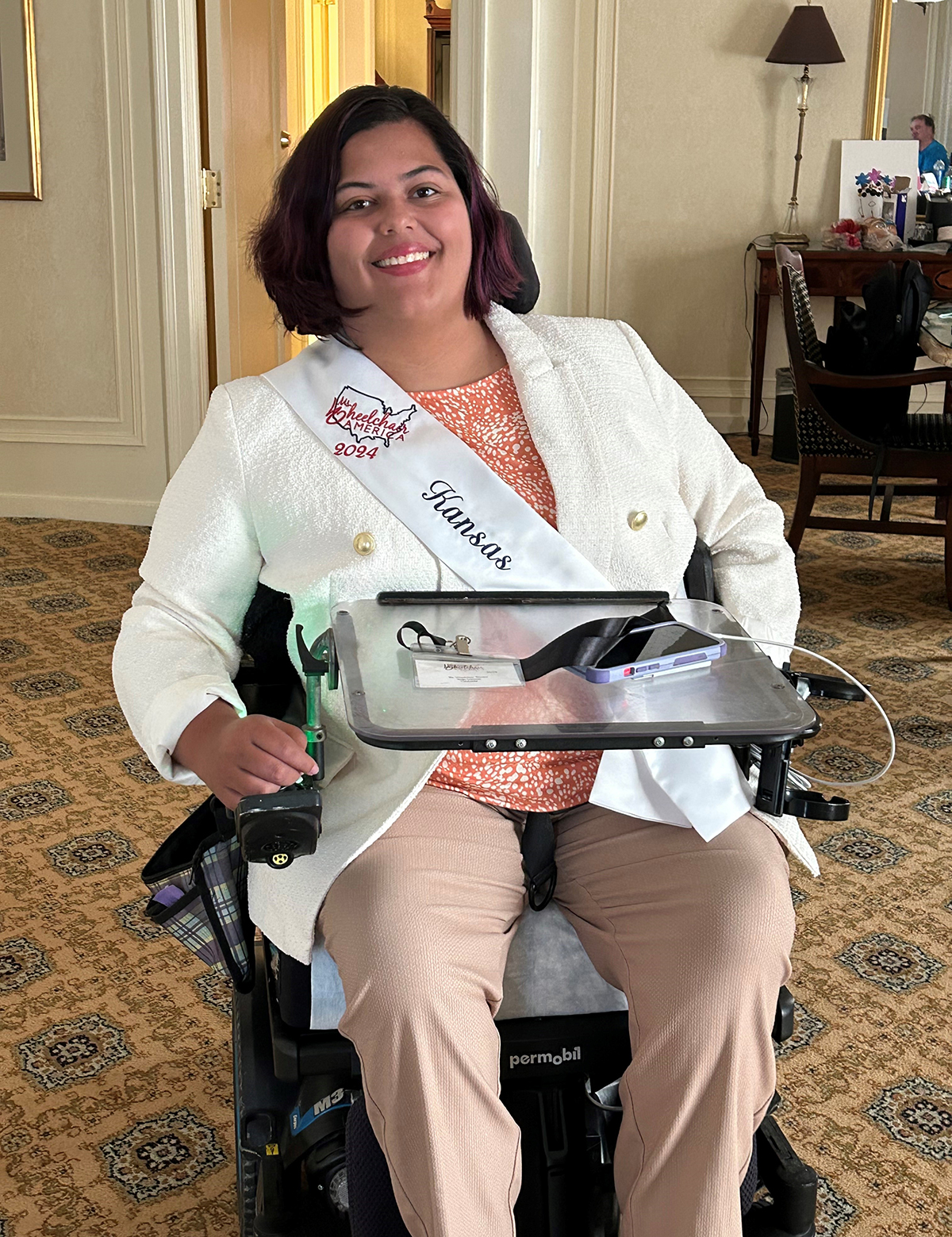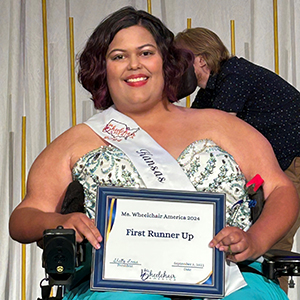Shining Example
Ms. Wheelchair Kansas breaking down stereotypes, showing capabilities of all in her classroom

Daija Coleman, b ed ’22, won the Ms. Wheelchair Kansas competition last spring and finished as first runner-up in the national competition. Photo submitted
From The Ichabod - Winter 2024
By Angela Lutz
When Daija Coleman, b ed ’22, was a kid, she didn’t have any role models who looked like her. Born with cerebral palsy, Coleman has always relied on an electric wheelchair to get around, but her disability hasn’t slowed her down. Growing up in Atchison, Kansas, she excelled in school and participated in theater and show choir. In high school, she learned about the history of the disability community and the importance of advocacy – and that’s when she decided to become the role model she longed to see.
She comes from a family of teachers – her mom, aunt, great-grandma and cousin have all taught at various levels. She has known working with kids was her passion from an early age, and she embraces the opportunity to help her students overcome their own insecurities and limitations. It’s no surprise she now teaches fifth grade at Atchison Elementary School.
“I like being able to break down any stereotypes (my students) might have had about themselves and what their abilities are,” Coleman said. “To see me have a successful career and do the things I need to do every day, I think that internally shapes their perceptions of what they’re capable of and what they can do. You never know what kinds of experiences someone comes to your classroom with. I can be a role model for them.”
This year, Coleman took her message to a national stage when she earned the title of Ms. Wheelchair Kansas and was later named first runner-up in the national competition. She said Ms. Wheelchair isn’t like a typical pageant but rather highlights the accomplishments and advocacy work of women who are wheelchair mobile. For her platform, Coleman focused on the importance of everybody being a disability advocate and using their privilege to amplify marginalized voices. She also gained several new platforms – and a lot of new friends.

“They say you show up at nationals with one platform and leave with countless more, and I agree with that,” she said. “You also leave with a bunch of friends who get what it’s like. None of us are the same, but we all understand each other in a way that nobody else ever will. That was really empowering and eye-opening for me as well, because I didn’t have a lot of friends who used wheelchairs growing up.”
Coleman’s platform was largely born out of her time at Washburn, where her senior capstone project focused on making the education department accessible for individuals with disabilities. No one like Coleman had taken the lead before to increase accessibility in Carnegie Hall, a 120-year-old building on the national register of historic places that was the home of Washburn's education department. With the help of her classmates, she gathered the necessary documentation, scheduled meetings and outlined what needed to be done – and people listened. With no viable option to transform Carnegie, the education department is now in the building that formerly housed the School of Law as a direct result of Coleman’s efforts.
“I started thinking about the legacy I was going to leave behind and my story while I was at Washburn,” Coleman said. “I started wondering how many others were deterred who could have been great educators. I knew the problem probably wouldn’t be solved during my time there, but it wasn’t about me. It was about all the people who would go through the program after me.”
One of Coleman’s cheerleaders in the education department was Tracie Lutz, m ed ’95, literacy block lecturer, who urged her to pursue her ambitious project full steam ahead. Lutz has always been impressed by Coleman’s leadership, empathy and communication skills, and she believed in her student’s ability to affect meaningful and lasting change on campus.
“She is a calm and loving presence that entices you to embrace what she’s sharing and thinking about,” Lutz said. “She’s made a difference at Washburn, and she did so in a manner that created a movement. Now we are in a building all students can come to with no limitations, and that’s because of her advocacy.”
Coleman is also cementing her legacy as a compassionate leader through her work with her students, who are learning important lessons about inclusiveness she hopes they will use to make the world a more equitable place.
“My hope is when my students are older, I will have created however many new advocates who will make the world a better place because they spent nine months in my classroom,” she said. “It makes them a little bit more cognizant, and it’s obvious I’m different but that’s never really bothered me. I just take it as an opportunity to show people what I’m capable of, and that’s something I get to do every day when I go to work."